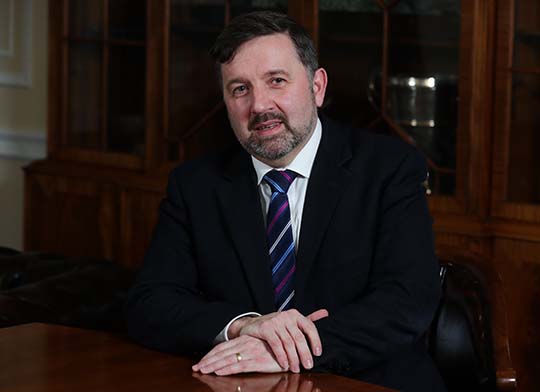Health Minister Updates on stroke and orthopaedic service provision
Health Minister Robin Swann has announced important initiatives to improve stroke care and rebuild orthopaedic surgery provision in Northern Ireland.
The Minister today published an Action Plan setting out a programme of reform for stroke services. This includes timescales for improvements in key areas including a seven day assessment service for Transient Ischemic Attacks (also known as ‘mini strokes”), a 24/7 Thrombectomy service, the roll out of Early Supported Discharge to all Trusts and the development of community-based services for stroke survivors.
The Minister today also announced initiatives involving Elective Orthopaedic Hubs at Musgrave Park in Belfast Trust, Southern Trusts and Western Trusts. These Hubs will provide a regional core for orthopaedic services to reduce waiting lists and will include ring-fenced staff and beds.

It is intended that the development of this hub model will lead to regionalisation of services through single waiting lists.
The Minister also announced a new Elective Orthopaedic Surgery Recovery Board to regionally drive forward the rebuilding of orthopaedic surgery services badly affected during the pandemic.
Elective Orthopaedics has the longest, and largest, waiting lists in Northern Ireland with 25,526 people waiting for treatment as of 31 March 2022
Rebuilding priorities include increasing activity in terms of theatre lists and treatment sessions and increasing output from each theatre list and treatment session through new and improved ways of working. The Health Minister has also set a four month target – to 1 November 2022 – for orthopaedic surgery at Musgrave Park Hospital to be fully restored to pre-pandemic levels.
The establishment of the Recovery Board follows an external, clinically led review into orthopaedic services in NI. This was a Getting It Right First Time (GIRFT) review – a process which is also being used within the NHS in GB.
Mr Swann today said: “I am committed to re-building and transforming our health service and I will continue to do everything I can to address the many deep seated problems that we are facing.
“In recent weeks, I have announced significant investment and initiatives to get more people off waiting lists, as well the development of a design plan for the future shape of our hospital network.
“Today’s announcements on stroke services and orthopaedic surgery will also improve patient care.
“I very much welcome the GIRFT review and hope it will help turn the page on a difficult and frustrating chapter for orthopaedic surgery.”
The publication of the stroke care action plan follows the Reshaping Stroke Care public consultation undertaken by the Department of Health in 2019. Over 19,500 responses were received to this consultation. The public consultation analysis has also been published today.
“The pandemic regrettably delayed the decision making on the consultation, but I am very pleased to be able to publish the action plan today. It sets out an ambitious, multi-year programme of reform,” the Minister continued.
“Among the many important innovations, I very much welcome the progress towards a 24/7 Thrombectomy service. It was extended to a seven day a week service in 2020 with over 80 people benefitting from this potentially life changing procedure at weekends since this expansion.”
The Minister said: “In terms of hospital services, the consultation also proposed a new network of Hyper Acute Stroke Units (HASUs) and Acute Stroke Units (ASUs) be established.
“This has been the subject of widespread concern, particularly in relation to travel times to HASUs.
“Whilst supportive in principle of the development of Hyper Acute stroke care, I believe more work is needed before decisions on the locations of HASUs and ASUs can be made. In particular, the evidence base that underpinned the 2019 consultation needs to be updated and enhanced, including on the implications for stroke care of our ageing population.
“Further external analysis will be undertaken to identify and evaluate options for the establishment of Hyperacute Stroke Care, with a preferred option to be identified by the summer of 2023.
“This allows further consideration of legitimate concerns raised in the public consultation. It is also vital that any decisions are based on a robust evidence base.”
Further details of the new initiatives on stroke services and orthopaedic surgery are provided in a written statement to the Assembly issued by the Health Minister today.























